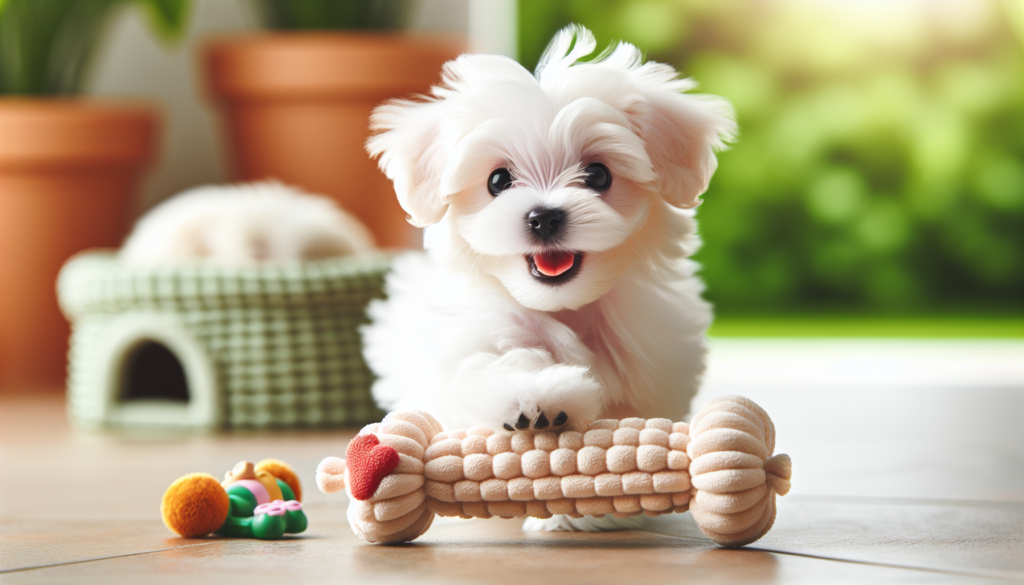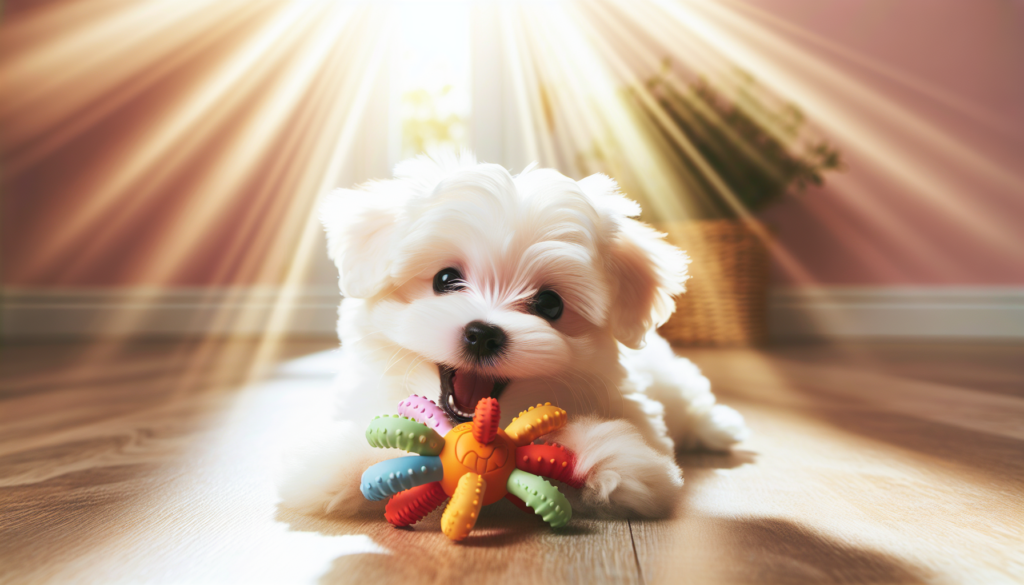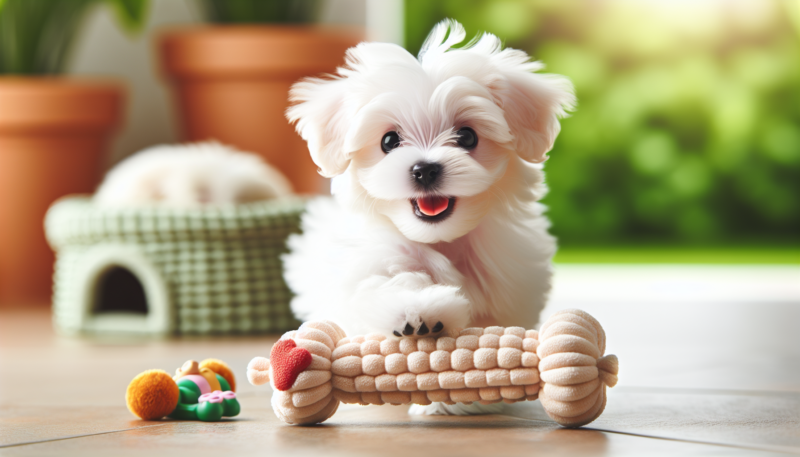If you find yourself constantly nursing tiny teeth marks on your hands and feet, fear not – we’re here to help you put an end to the biting frenzy! In this article, you’ll discover simple yet effective techniques to stop your adorable Maltese puppy from sinking their teeth into everything they come across. From understanding the root causes of their biting behavior to implementing gentle training methods, get ready to foster a well-mannered and bite-free bond with your furry little friend. Say goodbye to those nibbles and hello to peaceful playtime!

Understanding Puppy Biting
Puppy biting is a natural behavior for Maltese puppies, as it is their way of exploring the world around them and engaging in play. However, it is important to address and redirect this behavior early on to prevent it from becoming a problem in the long run. By understanding the reasons behind puppy biting and implementing effective training techniques, you can teach your Maltese puppy to have proper bite inhibition and to interact safely with humans and other animals.
Importance of Addressing Puppy Biting
Addressing puppy biting is essential for several reasons. Firstly, it prevents any potential harm to yourself, your family members, or other pets. Maltese puppies have sharp teeth, and their bites can be painful, especially as they grow older. Secondly, addressing puppy biting helps to establish a healthy and respectful relationship between you and your furry friend. By setting boundaries and rules, you establish yourself as the pack leader and teach your puppy to interact in a gentle and controlled manner. Lastly, addressing puppy biting lays the foundation for teaching other obedience commands and preventing future behavioral issues.
Common Reasons for Maltese Puppies to Bite
Maltese puppies may resort to biting for various reasons. These can include teething, exploring their environment, seeking attention, or simply playing too rough. It is important to understand these reasons to effectively address and redirect biting behavior.
Setting Boundaries and Rules
Establishing yourself as the pack leader is crucial in managing and preventing puppy biting. Start by implementing consistent rules and boundaries for your Maltese puppy. This includes teaching them to respect personal space, not biting during play, and responding to your commands promptly. By being consistent and providing clear expectations, you establish a structure that helps your puppy understand what is acceptable behavior.
Teaching the ‘No Bite’ Command is an effective way to establish boundaries with your Maltese puppy. Whenever your puppy bites, firmly say “no bite” and withdraw your attention for a brief moment. This helps them understand that biting leads to negative consequences. Remember to follow this up with positive reinforcement when they exhibit appropriate behavior, such as gentle play or chewing on appropriate toys.
Using positive reinforcement is an essential component of setting boundaries and rules. Reward your Maltese puppy with treats, praise, or playtime when they engage in appropriate behavior. This reinforces the idea that gentle play and appropriate chewing are desirable, while biting is not.

Redirecting Unwanted Biting Behavior
Providing appropriate chew toys is crucial in redirecting your Maltese puppy’s biting behavior. Make sure to have a variety of chew toys available, including soft plush toys, dental chews, and rubber toys specifically designed for teething puppies. When you notice your puppy starting to bite or chew on inappropriate items, redirect their attention to one of these toys. Praise them when they engage with the toy instead of biting on furniture or other household items.
Engaging in interactive play is another effective way to redirect your Maltese puppy’s biting behavior. Use toys such as ropes or balls to engage in active play sessions. This not only provides an outlet for their energy but also encourages appropriate play behavior. By actively participating in play with your puppy, you establish a bond and teach them how to interact without resorting to biting.
Using distractions can be helpful when redirecting unwanted biting behavior. If your Maltese puppy starts to bite, try redirecting their attention by making a loud noise or offering a treat. This interrupts their focus on biting and redirects their attention to something else. Over time, your puppy will learn to associate the negative consequences of biting with these distractions.
Managing the Environment
Creating a safe space for your Maltese puppy is crucial in managing and preventing biting behavior. Set up a designated area in your home where your puppy can rest, play, and sleep comfortably. Make sure this area is free of any potential hazards or items that may encourage biting, such as loose wires or valuable household items.
Supervising and limiting access to stimuli is important, especially during the early stages of training. Keep a close eye on your Maltese puppy and intervene when you notice them becoming overly excited or exhibiting signs of biting. By limiting exposure to potentially stimulating situations, you reduce the chances of biting occurring.
Avoiding rough play is essential in managing and preventing biting behavior. While it may be tempting to engage in rough play with your Maltese puppy, this can inadvertently reinforce biting behavior. Instead, focus on gentle and calm interactions, promoting a positive and peaceful environment for your puppy to thrive in.
Teaching Bite Inhibition
Bite inhibition refers to a dog’s ability to control the force of their bite, preventing serious harm to others. Teaching bite inhibition to your Maltese puppy is crucial, as it helps them understand the appropriate amount of force to use when playing or interacting with humans and other animals.
Gradual training with soft pressure is a effective way to teach bite inhibition. Use your hand or fingers to simulate a gentle bite on your puppy’s muzzle or body. If your puppy bites too hard, let out a high-pitched yelp or make a loud noise to indicate pain. This mimics how other puppies would respond during play. By repeating this process consistently, your Maltese puppy will gradually learn to control the force of their bites.
Consistency and repetition are key in teaching bite inhibition. Practice bite inhibition exercises regularly and reinforce appropriate behavior with rewards and praise. It is important to remember that this training process takes time, and your Maltese puppy may still have occasional lapses. Be patient and continue reinforcing positive behavior while addressing any biting issues that arise.
Seeking professional guidance is recommended if you are facing difficulties in teaching bite inhibition to your Maltese puppy. A professional dog trainer can provide expert advice, customized training techniques, and additional resources to help you address any specific challenges you may be experiencing. They can also evaluate your puppy’s behavior and provide guidance on how to best address any biting issues.
Socializing Your Maltese Puppy
socializing your Maltese puppy is a crucial aspect of their development, as it helps them acclimate to different people, animals, and environments. Proper socialization can also help reduce the chances of fear or anxiety-based biting and encourage positive interactions with others.
Providing positive experiences with other dogs is an important part of socializing your Maltese puppy. Arrange playdates with other well-behaved and vaccinated dogs, ensuring a controlled and safe environment for interactions. This allows your puppy to learn proper social cues and build confidence when engaging with other canines.
Interacting with different people and environments is essential in socializing your Maltese puppy. Expose them to various situations, such as trips to the park, visits to friends’ houses, or walks in busy areas. By gradually introducing them to new experiences, you help them develop a calm and confident demeanor, reducing the likelihood of fear or anxiety-based biting.
Enrolling in puppy socialization classes can provide structured socialization opportunities for your Maltese puppy. These classes are designed to expose puppies to various stimuli and teach them appropriate behavior in a controlled environment. Trained instructors can guide you in managing biting behavior and help your puppy develop essential social skills.
Addressing Special Cases
Sometimes, Maltese puppies may exhibit biting behavior that goes beyond what is considered normal during play or training. In these cases, it is important to address the underlying causes and seek appropriate guidance to ensure your puppy’s well-being and the safety of those around them.
Fear or anxiety-based biting may occur if your Maltese puppy feels threatened or overwhelmed. It is important to identify and address the specific triggers causing fear or anxiety. Gradual desensitization techniques, combined with positive reinforcement, can help alleviate these issues. Consulting a professional dog trainer or behaviorist experienced in working with fearful or anxious dogs is recommended for specialized guidance.
Resource guarding biting can occur when a Maltese puppy becomes possessive of items such as food, toys, or even people. This behavior should be addressed immediately to prevent any potential harm. Consult a professional dog trainer or behaviorist who can guide you in implementing appropriate techniques to manage and modify this behavior.
Aggressive or inappropriate biting is a serious issue that requires immediate attention and professional help. If your Maltese puppy consistently displays aggressive behavior, such as biting without provocation or causing injury, it is important to consult a professional dog trainer, behaviorist, or veterinarian. They can evaluate your puppy’s behavior, determine the underlying causes, and develop a behavior modification plan tailored to your specific situation.
Preventing Reinforcement of Biting
Prevention plays a vital role in ensuring your Maltese puppy learns to inhibit their biting tendencies. By avoiding actions that may unwittingly reinforce biting behavior, you can set your puppy up for success in their training.
Avoiding rough play with hands or feet is crucial. While it may seem cute or harmless initially, using your hands or feet as play objects can confuse your puppy and encourage them to bite inappropriately. Instead, focus on using appropriate toys and engaging in gentle play.
Consistent consequences for biting are necessary to deter your Maltese puppy from persistently engaging in biting behavior. When your puppy bites, firmly say “no bite” and withdraw your attention. This may include leaving the room or ending playtime temporarily. Consistency is key to ensure your puppy understands that biting leads to an undesirable outcome.
Ignoring attention-seeking bites is an effective way to avoid reinforcing this behavior. If your Maltese puppy bites to seek attention, immediately withdraw your attention and turn away. By denying them the desired response, you discourage the behavior. Redirect their attention to a toy or engage in a different activity once they have calmed down.
Consistency and Patience
Consistency and patience are paramount throughout your Maltese puppy’s training journey. By maintaining a structured routine, you create an environment in which your puppy knows what to expect and can thrive. Consistently applying training techniques, such as setting boundaries and reinforcing positive behavior, helps your puppy understand the desired outcome.
Celebrating progress and being patient are important aspects of training your Maltese puppy. Recognize and reward their achievements, no matter how small. Praise, treats, and playtime are effective motivators that reinforce positive behavior. Remember that each puppy learns at their own pace, and setbacks are a normal part of the training process. Patience and perseverance will ultimately lead to success.
Avoiding harsh punishments is crucial in maintaining a positive and healthy relationship with your Maltese puppy. Physical punishments or harsh reprimands can provoke fear and anxiety, which may exacerbate biting behavior or lead to other behavioral issues. Instead, focus on positive reinforcement and redirection techniques that promote a respectful and trusting bond with your puppy.
Seeking Professional Help
If you are facing difficulties in addressing your Maltese puppy’s biting behavior or if the behavior escalates to a concerning level, seeking professional help is highly recommended. Professional dog trainers are experienced in working with various breeds, including Maltese puppies. They can provide expert guidance, customized training techniques, and additional resources to help you address your specific challenges. In cases where biting behavior is severe or accompanied by other concerning behaviors, a behaviorist’s evaluation may be necessary. A behaviorist can assess your puppy’s behavior, determine underlying causes, and develop a comprehensive behavior modification plan. Additionally, consulting with a veterinarian can help rule out any medical issues that may contribute to biting behavior.
Remember, addressing and redirecting your Maltese puppy’s biting behavior is a process that requires time, consistency, and patience. By understanding the reasons behind puppy biting and implementing effective training techniques, you can create a safe and harmonious environment for both you and your furry friend. With proper training and socialization, your Maltese puppy will grow into a well-behaved and loving companion.
